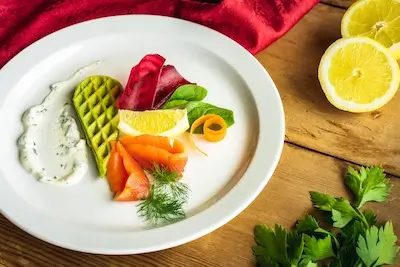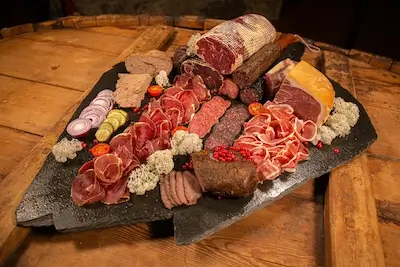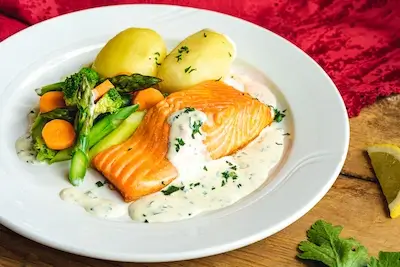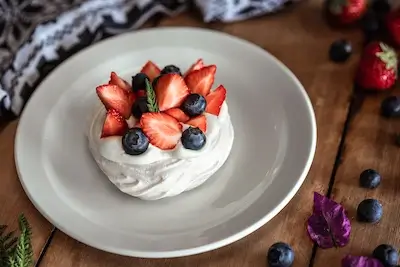Breakfast: 08–10 am
Lunch: 1.30–3 pm
Dinner: 7 pm
A la carte: 11am –5 pm
Good food is important to us
Venabu is well known for its delicious, homemade food.
Good quality, local ingredients and healthy, homemade food are important values in our kitchen. Our chefs use quality ingredients where the flavours speak for themselves. Many of these are sourced from local producers.
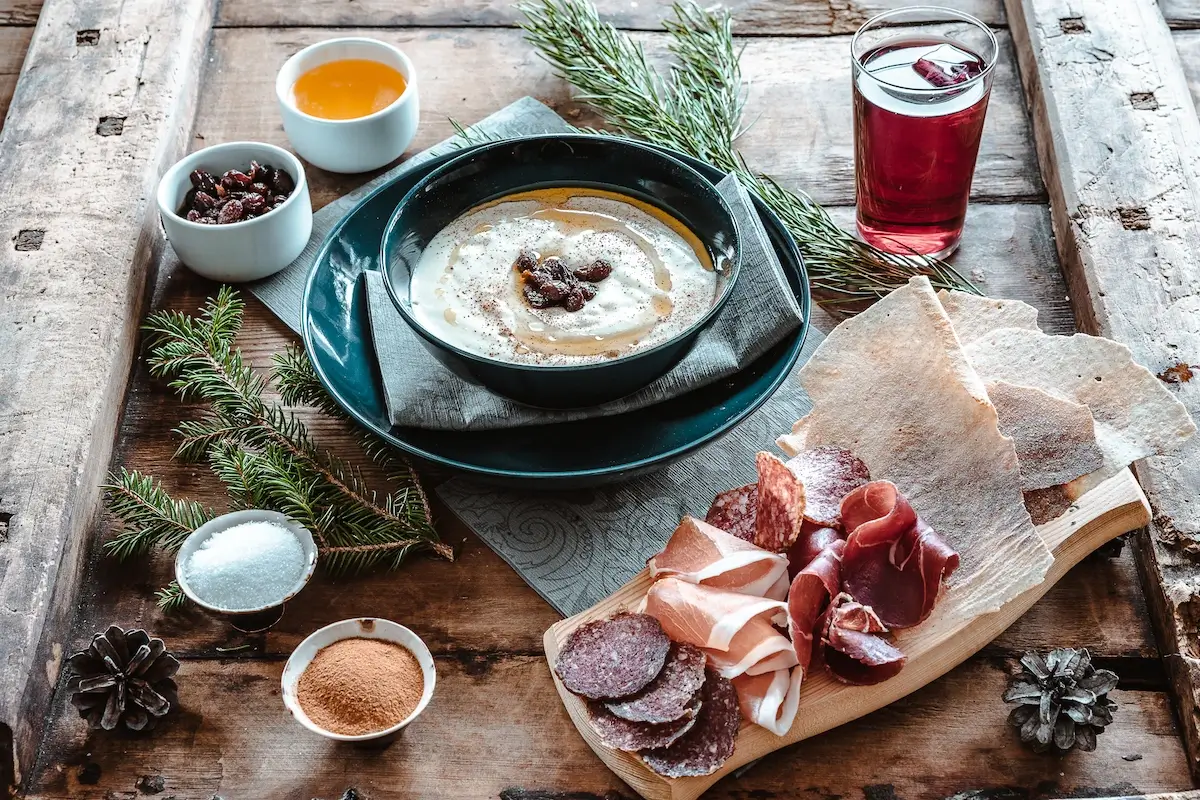
Tradition and innovation
Norwegian cuisine traditionally favours meat and fish. Gudbrandsdalen, the main valley local to Venabu, has its own rich food traditions. At Venabu, we want to preserve and also pass on this knowledge. Our chefs are experts in time-honoured cooking methods such as curing, drying and smoking.
In addition to traditional food, you will find more modern dishes in our restaurant. Our talented chefs come from a number of countries and have different backgrounds. They are encouraged to express their creativity and passion for food. We believe that these qualities, blended with a respect for traditional, local and seasonal food, make our food special.
Tasty vegetarian food served every day
You will find vegetarian choices at every meal at Venabu. On request we also prepare vegan dishes. If you would like a purely vegetarian offer, please let us know in advance.
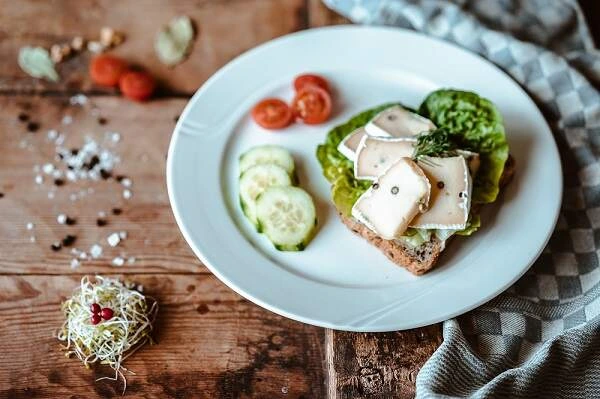
Reassurance for allergy sufferers
Food allergies can be difficult when eating out. At Venabu, we are committed to offering safe – and tasty – food. Allergy-friendly dishes should taste as good as our ordinary menus.
To offer you a good alternative, please let us know about specific requirements before arrival. It is also important that you also communicate about your allergies with the waiters during the meal.
Local suppliers
As far as possible, we use local suppliers. This ensures fresh ingredients and reduces food miles. We know our suppliers personally, giving us the reassurance that we serve meat from animals that have lived a good life. Supporting local farmers and businesses is also important for a sustainable local economy.
Gudbrandsstugua
The idyllic Gudbrandsstugua farm is a 15-minute drive from Venabu. It has sheep, mohair goats, dogs, cats and rabbits. Gudbrandsstugua is one of the few farms in the district that has Old Norse sheep (“wild sheep”). The sheep are well adapted to the Nordic climate, and go outside all year round. In the summer, they are at pasture on Venabygdsfjellet. These sheep are hardy and grow slowly. They take good care of their lambs and have a strong herd instinct. They live a healthy, active life in the flock.
Wild sheep from Gudbrandsstugua will be served on several occasions at Venabu.
Saffie – the 'lefse' baker in Ringebu
Originally from Afghanistan, Saffie now lives locally and produces high quality, traditional Gudbrandsdal lefse and flatbreads. These are real potato flatbreads and lefse, which are rolled out by hand and fried on a griddle. They add the finishing touch to light dishes and are a good accompaniment to most food.
Hev Ringebu
Hev in Ringebu has been very successful since its opening in 2019. Hev focuses on offering high-quality baked goods, and is our main supplier of bread. Hev sources its bread from the famous ‘Bakery in Lom’ which is owned and run by Morten Schakenda who is one of the best known chefs in Norway.
Gillebo Systu’n
The farm Gillebo Systu’n in Øyer produces cauliflower and broccoli. When the vegetables are in season, we make sure to shop locally and support this dedicated farmer.
Ringstad honey
The small farm Ringstad, in Sør-Fron, produces honey of the highest quality. The beekeeper, Sergey Shulga is also an organist in Sør-fron church. The flowers that bees visit give a flavour to their honey. The Ringstad bees gather nectar from raspberries, blueberries, dandelions, clover and mountain cranberries.
Bonden Sylte
The pork we serve comes from outdoor pigs from Myrvoll farm, Kvitfjell. Farmer Sylte lets the pigs live close to nature with a varied diet. The pigs forrage in the soil and turn the peat, eating what they find outside. The animals are also fed with whey from the dairy, mash from a local brewery and Norwegian concentrate without soy. Using these by-products from local food production contributes to recycling in the region.
The pigs are also important “workers” for the farmer: as the pigs forrage they rotate the soil. This prepares the ground ready for sowing with minimal use of machines.
The pigs live natural and active lives, without undue stress. We believe that this is reflected in the quality of the meat.
Annis Pølsemakeri
Sausage-maker and delicatessen
Annis Pølsemakeri is one of the area’s most successful companies, widely known for meat products of the highest quality. Anni’s main branch is in the village of Ringebu, just a 20 minute drive from Venabu. Anni also has a branch in Mathallen in Oslo.
Kaurstadbær
In Gudbrandsdalen, Kaurstad strawberries are well known and very popular. Working on his farm a few kilometres below Venabu, Per Otto Kaurstad produces the juiciest, sweetest strawberries you can imagine. A cool climate gives a longer ripening time and long summer days make the berries especially flavourful.
At Venabu, we only serve strawberries when they are in season here in Ringebu. Our best summer dessert is as simple as it is good: a bowl of fresh strawberries.
Local game
There are many game animals in the forest and mountains close to Venabu. Their numbers are controlled through hunting, which is also an important part of local culture. Wild reindeer, moose and deer are commonly hunted and you will often find these healthy meats on our menu. Tore, responsible for the buildings and grounds at Venabu, is also an experienced hunter. He supplies us with moose meat every autumn. Tore knows the land and understands the animals’ behaviour and lifecycles. This knowledge, and his skill, mean that when the end comes it is humane, minimising stress for the animal. This is an important value to Tore, both in terms of animal welfare and to provide meat of the highest quality.
Sustainability in our kitchen
As a business we work to reduce our impacts on the environment across all our departments. In addition to increasing the number of ingredients that we source locally and seasonally, we work to reduce food waste. Food waste is a problem in Norway as elsewhere, addressing this in our own kitchen is part of our work towards sustainability.

